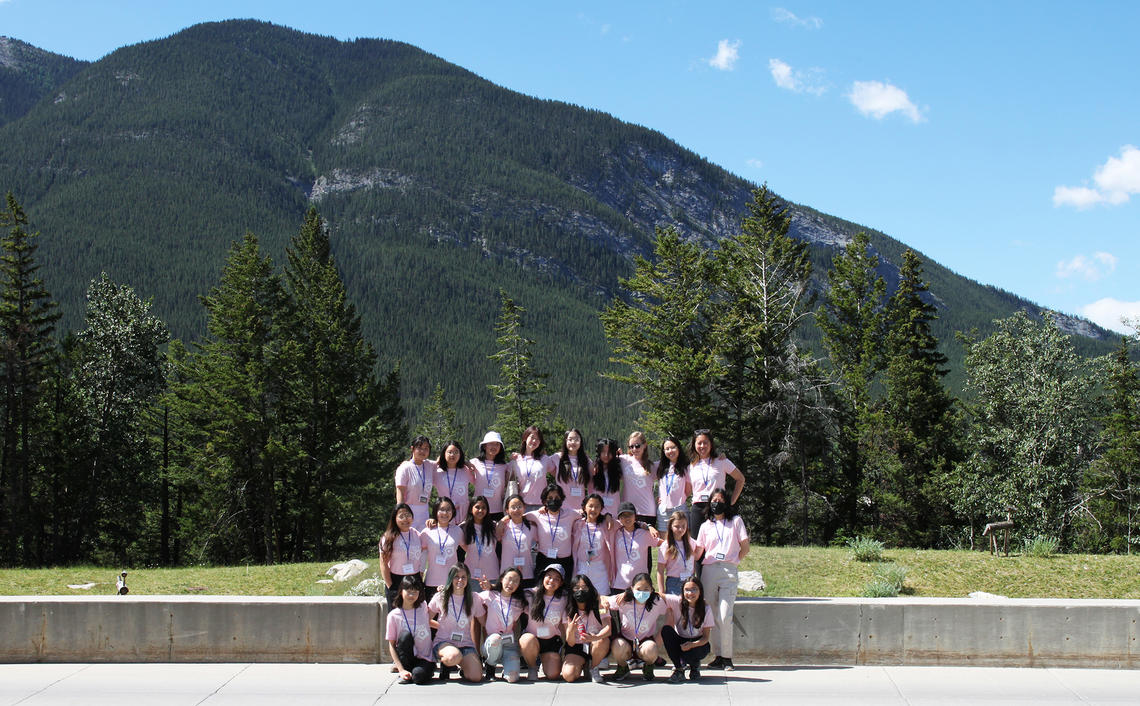
July 22, 2022
Summer camp inspires girls to follow passion for math
While most Calgarians spent the week of July 10 to 17 checking out the rodeo and eating fried foods at the Stampede, a group of 21 young girls had fun in a different way: doing math.
A new summer camp being run by the University of Calgary — featuring sessions like Zombie Modelling, Probability Paradoxes, Data Science and the Amazing Math Race — created a safe space for girls with a passion for math to have fun and learn about new and interesting topics in their favourite subject.
And if you think there were a limited amount of girls in Alberta who love math, think again, because over 150 students applied to attend.
Excitement level high among applicants
“It was nice to see how many girls in Calgary and Alberta were excited to apply,” says Dr. Lauren DeDieu, PhD, an instructor in the Department of Mathematics and Statistics and director of the Math Attack Summer Camp for Girls.
The camp started when the Math Attack Society, a high school student-run non-profit, approached DeDieu and University of Alberta colleague Sean Graves to see if they would be interested in organizing a girls' camp.
“I had planned on doing a girls' camp now that things are getting back to in-person, so the timing aligned and I agreed to be the director of the camp,” says DeDieu, who also runs Girls Excel in Math, a Saturday enrichment program for girls who are interested in exploring mathematical topics they wouldn’t normally see in the classroom.
The 21 successful applicants were chosen based on a combination of mathematical ability and interest in attending the camp.
“We wanted them to be pretty advanced mathematically and be excited to attend the camp as well,” says DeDieu.
The camp was overnight and involved five days on the main UCalgary campus and then three days in Banff at the Banff International Research Station.

Lauren DeDieu and the 21 Math Attack Summer Camp girls on their trip to the Banff International Research Station.
Lauren Dedieu
A typical day for the camp began at 9 a.m., with two mathematical sessions lasting 75 minutes each, followed by lunch, two more sessions in the afternoon, then free time, dinner, and social activities in the evening.
Mathematically advanced campers
The participants were Grade 6 to 10 students who identify as girls, and the camp introduced them to topics they would see at the university level, but the level of difficulty could be toned up or down.
“We tried to design it so there’s an easy entry level so everyone can get their hands dirty, but if they get it quickly, the activities can ramp up,” says DeDieu.
The sessions were led by graduate students and faculty members, and were more hands-on rather than lecture style.
One camper who attended enjoyed the courses on combinatorics and logic problems, which showed how math can be applied to explain or solve real-world problems, and how fun it could be to work through a challenging yet interesting puzzle.
“This was a once-in-a-lifetime experience, and I really loved it,” she says. “The supportive attitude of everyone made it feel like home, and in only a week I got so attached to everyone.”
Nobody was left out
The 130 students who did not make the Math Attack camp were not left out, however. They participated in a three-day Girls Excel in Math Summer Camp from July 11 to 13, which featured similar sessions to the overnight camp.
“It’s important to have outreach opportunities available to all students to get excited about math,” says DeDieu.
DeDieu says the hope of the camp is to create more excitement in girls for math and STEM, as a Statistics Canada report found girls graduating from high school are 29.8 per cent less likely to enrol in a post-secondary STEM program than boys. She says there is a gender bias involved in this as well.
“They’ll say ‘oh, you’re going to be a great female mathematician,’ versus ‘you’re going to be a great mathematician,’ these subtle reminders that maybe this field isn’t for you,” says DeDieu.
DeDieu says it was encouraging to see the amount of girls who applied to the camp, as other outreach programs run by the math department have skewed more male. One of the goals of the camp is to inspire girls to pursue their passion for mathematics and connect with peers who share similar interests.
“Part of the goal of the camp is to expose students to female role models in math so they can start to see themselves as part of the mathematical community,” says DeDieu.





